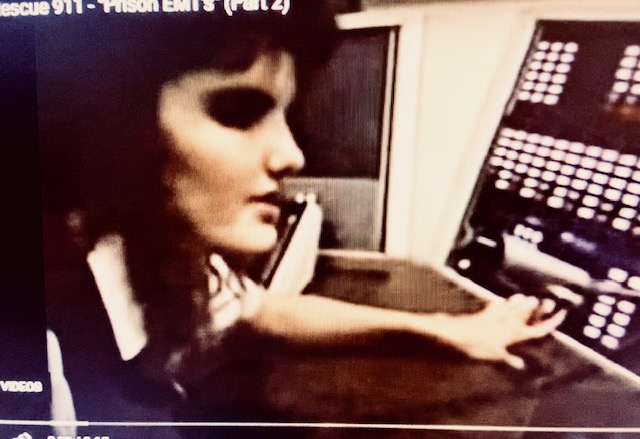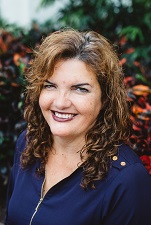“This is 9-1-1. What is your emergency?”
I don’t often reflect publicly on the fifteen years I served as a 9-1-1 Operator and Police Dispatcher for the city of Nashville. This was my first career-type job as a somewhat sheltered eighteen-year-old girl, and I was quickly stationed on the midnight shift where all the action took place. Each night at 10:00 p.m., I proudly donned my navy blue civilian uniform and entered through security gates, metal detectors, and controlled access doors into a windowless room with nothing but computer screens in every direction. We served as the hub of activity – the communications center – for the entire city.
Still, most would never know we were there. Completely invisible, a voice behind a screen.

When you’re facing an emergency, no one thinks about the voice on the other end of the line, right?
As a 9-1-1 Operator, it was my job to ask the right questions on the front end, to fill in the blanks, and to paint a complete but succinct picture so the first responders could be prepared. As the only link from those needing help to those who could provide it, I had to determine which details mattered most and then continued to update in real-time as the situation changed and the police officers drew closer.
There were many more like me, and we made a great team. At our center, we answered more than 1,000,000 phone calls per year.
That’s one million unfinished stories.
We jumped with both feet into what could only be described as the worst day of someone’s life. But we showed up over and over again, ready to make a difference. In dire situations, we remained on the line until we knew our police officers had reached the caller.
But that’s where our part of the story ended. We had to move on to the next call, and rarely did we learn the outcome of each situation.
Still, there were many I couldn’t forget if I tried:
- The six-year-old boy who hid under the bed to call 9-1-1, as he learned in school. “My mother just got ‘shocked,’” he whispered.
- The older gentleman who explained he’d been sick for a while and that he’d left the door open for us. He hung up before anyone could stop him from shooting himself.
- The deaf person who couldn’t speak, but knew enough to lay the phone down so we could listen to the abuse for ourselves.
I’ll never forget their voices. In that environment, you can do everything right and follow every policy correctly, but the ending still turns out incredibly wrong.
That’s a lot of weight to carry through the years.
Looking back, my career with the police department was definitely the most rewarding and demanded everything I had to offer.
Now that I’m an author, I realize now how much those years of crisis management, multi-tasking and finely tuning my listening skills created the writer I am today.
One reason I enjoy writing fiction is that I can control the outcome. The hero gets to live. He has a change of heart. Help arrives in time.
‘Happily’ can find its ‘ever after’ when given the chance and a few more chapters, right? That is truly the greatest feeling; giving our beloved characters the fulfilling ending they deserve.
I couldn’t help but think how the two jobs are similar – being a 9-1-1 operator and an author.
Authors should be invisible, behind the scenes. Behind the screen. But they also serve as a link between a quickly developing situation and the responders, or readers, who are following it. It’s our job to ask and answer the right questions, to fill in the blanks, and to determine which details matter most. To get to the action, and tell them only what they need to know.
I believe it all starts with the same question.
What is your emergency?
Perhaps we should ask this of our characters. I suspect they’re ready to tell us.
Where does our story actually start? Sometimes as a writer, it’s tough to figure that out. We know too much, so we may try to cram it all in on the front end.
However, in real life, in life-and-death situations, we see it clearly.
- For the little boy under the bed, he simply described what he could see and hear. Her red hair on the floor. A man slamming the door on his way out. The sound of a car speeding off.
- For the man with the terminal illness, he made it clear he’d suffered long enough. But he wanted to make sure someone found him.
- For the deaf person who literally screamed for help, he had to make sure someone finally heard him. And we did.
As an author, it’s up to us to find the quickest and most accurate way to share our stories. To figure out which details matter. And why.
Not every story is a true crime or thriller, but every story needs a strong starting point. Even in whimsical love stories, the readers need to know what just happened and why we’ve been gathered.
Like these callers, our characters deserve every chance at a happy ending.
In the meantime, we can walk them through the roughest day of their lives, and paint an accurate picture for those who care to respond. Our readers.
Until then, I’ll meet you in the first chapter.
Stay on the line with me.
Help is on the way.

Janet Morris Grimes
Fascinating Friday Feature
Janet is the new host for the 2nd and 4th Friday posts. Here at the Christian Author Network, this is our way of sharing fun and interesting tidbits from our isolated, mysterious writing chair. If you’d like to contribute, please contact Janet through her website at http://janetmorrisgrimes.com.


Deb Haggerty
January 14, 2023 - 00 : 17 : 04Great article and great analogy. We’ll worth reading.